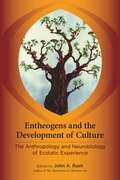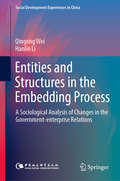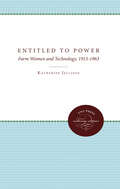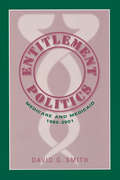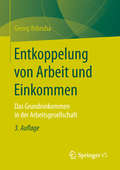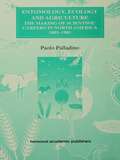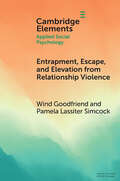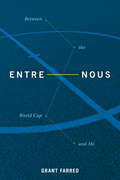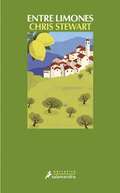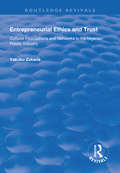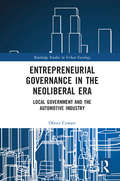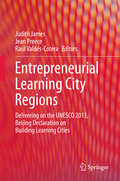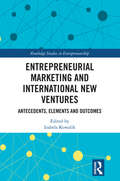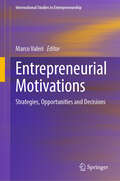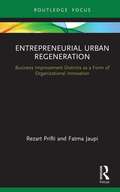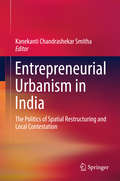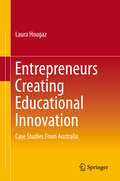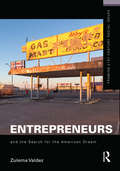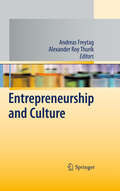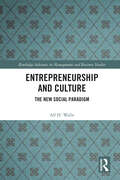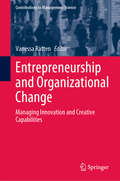- Table View
- List View
Entheogens and the Development of Culture: The Anthropology and Neurobiology of Ecstatic Experience
by John RushEntheogens and the Development of Culture makes the radical proposition that mind-altering substances have played a major part not only in cultural development but also in human brain development. Researchers suggest that we have purposely enhanced receptor sites in the brain, especially those for dopamine and serotonin, through the use of plants and fungi over a long period of time. The trade-off for lowered functioning and potential drug abuse has been more creative thinking--or a leap in consciousness. Experiments in entheogen use led to the development of primitive medicine, in which certain mind-altering plants and fungi were imbibed to still fatigue, pain, or depression, while others were taken to promote hunger and libido. Our ancestors selected for our neural hardware, and our propensity for seeking altered forms of consciousness as a survival strategy may be intimately bound to our decision-making processes going back to the dawn of time.Fourteen essays by a wide range of contributors--including founding president of the American Anthropological Association's Anthropology of Religion section Michael Winkelman, PhD; Carl A. P. Ruck, PhD, Boston University professor of classics and an authority on the ecstatic rituals of the god Dionysus; and world-renowned botanist Dr. Gaston Guzma, member of the Colombian National Academy of Sciences and expert on hallucinogenic mushrooms--demonstrate that altering consciousness continues to be an important part of human experience today. Anthropologists, cultural historians, and anyone interested in the effects of mind-altering substances on the human mind and soul will find this book deeply informative and inspiring.From the Trade Paperback edition.
Enticing Hard-to-Reach Writers
by Ruth AyresIn her moving and personal book Enticing Hard-to-Reach Writers. Ruth Ayres weaves together her experience as a mother, teacher, and writer. She explores the power of stories to heal children from troubled backgrounds and offers up strategies for helping students discover and write about their own stories of strength and survival. She shares her own struggles and triumphs and hard-earned lessons from raising a family of four adopted children. Her experience is invaluable to any teacher whose has met children living in poverty, in unstable households, or in fear of abuse. Ayres explores brain research and the ways trauma can change the brain and how encouraging all students to write can help offset some of these effects. She believes that all students benefit from revealing their stories, by communicating information and opinion that allows darkness to turn to light in the lives of children. In the last part of her book she offers up practical suggestions for enticing all writers, regardless of their struggles. Enticing Hard-to-Reach Writers invites you on a journey to become a teacher who refuses to give up on any student, who helps children believe that they can have a positive impact on the world, and who—in some cases becomes the last hope for a child to heal.
Entities and Structures in the Embedding Process: A Sociological Analysis of Changes in the Government-enterprise Relations (Social Development Experiences in China)
by Qingong Wei Hanlin LiThis book provides a rare integrative interpretation of government-enterprise relations in China, offering readers a comprehensive understanding of the topic. Focusing on the government and its principal goals, it describes the transition of government-enterprise relations and highlights the embedding of the entities of government and enterprises in specific political, economic and social environments. Further, it analyzes how the government’s institutional arrangement regulates the behavior of various types of enterprises with different structures, and the logic mechanisms such institutional arrangements use to change and shape government-enterprise relations. Based on these issues and logic mechanisms, the book points out the complexity of government-enterprise relations and the diversity of their transition path, thus reflecting some typical features in the overall reform of China and discussing specific factors related to China’s social development experience.
Entitled to Nothing: The Struggle for Immigrant Health Care in the Age of Welfare Reform (Nation of Nations #29)
by Lisa Sun-Hee ParkIn Entitled to Nothing, Lisa Sun-Hee Park investigates how the politics of immigration, health care, and welfare are intertwined. Documenting the formal return of the immigrant as a “public charge,” or a burden upon the State, the author shows how the concept has been revived as states adopt punitive policies targeting immigrants of color and require them to “pay back” benefits for which they are legally eligible during a time of intense debate regarding welfare reform. Park argues that the notions of “public charge” and “public burden” were reinvigorated in the 1990s to target immigrant women of reproductive age for deportation and as part of a larger project of “disciplining” immigrants. Drawing on nearly 200 interviews with immigrant organizations, government agencies and safety net providers, as well as careful tracking of policies and media coverage, Park provides vivid, first-person accounts of how struggles over the “public charge” doctrine unfolded on the ground, as well as its consequences for the immigrant community. Ultimately, she shows that the concept of “public charge” continues to lurk in the background, structuring our conception of who can legitimately access public programs and of the moral economy of work and citizenship in the U.S., and makes important policy suggestions for reforming our immigration system.
Entitled to Power: Farm Women and Technology, 1913-1963 (Gender and American Culture)
by Katherine JellisonThe advent of modern agribusiness irrevocably changed the patterns of life and labor on the American family farm. In Entitled to Power, Katherine Jellison examines midwestern farm women's unexpected response to new labor-saving devices. Federal farm policy at mid-century treated farm women as consumers, not producers. New technologies, as promoted by agricultural extension agents and by home appliance manufacturers, were expected to create separate spheres of work in the field and in the house. These innovations, however, enabled women to work as operators of farm machinery or independently in the rural community. Jellison finds that many women preferred their productive roles on and off the farm to the domestic ideal emphasized by contemporary prescriptive literature. A variety of visual images of farm women from advertisements and agricultural publications serve to contrast the publicized view of these women with the roles that they chose for themselves. The letters, interviews, and memoirs assembled by Jellison reclaim the many contributions women made to modernizing farm life.Originally published in 1993.A UNC Press Enduring Edition -- UNC Press Enduring Editions use the latest in digital technology to make available again books from our distinguished backlist that were previously out of print. These editions are published unaltered from the original, and are presented in affordable paperback formats, bringing readers both historical and cultural value.
Entitled: Discriminating Tastes and the Expansion of the Arts
by Jennifer C. LenaAn in-depth look at how democratic values have widened the American arts scene, even as it remains elite and cosmopolitanTwo centuries ago, wealthy entrepreneurs founded the American cathedrals of culture—museums, theater companies, and symphony orchestras—to mirror European art. But today’s American arts scene has widened to embrace multitudes: photography, design, comics, graffiti, jazz, and many other forms of folk, vernacular, and popular culture. What led to this dramatic expansion? In Entitled, Jennifer Lena shows how organizational transformations in the American art world—amid a shifting political, economic, technological, and social landscape—made such change possible.By chronicling the development of American art from its earliest days to the present, Lena demonstrates that while the American arts may be more open, they are still unequal. She examines key historical moments, such as the creation of the Museum of Primitive Art and the funneling of federal and state subsidies during the New Deal to support the production and display of culture. Charting the efforts to define American genres, styles, creators, and audiences, Lena looks at the ways democratic values helped legitimate folk, vernacular, and commercial art, which was viewed as nonelite. Yet, even as art lovers have acquired an appreciation for more diverse culture, they carefully select and curate works that reflect their cosmopolitan, elite, and moral tastes.
Entitlement Politics: Medicare and Medicaid, 1995-2001 (Social Institutions And Social Change Ser.)
by David G. SmithEntitlement Politics describes partisan attempts to shrink the size of government by targeting two major federal health care entitlements. Efforts to restructure or eliminate entitlements as such, and to privatize and decentralize programs, along with more traditional attempts to amend and reform Medicare and Medicaid have radically transformed policymaking with respect to these programs. However, they have failed to achieve fundamental or lasting reform.Smith combines historical narrative and case studies with descriptions of the technical aspects and dynamics of policymaking to help the consumer understand how the process has changed, evaluate particular policies and outcomes, and anticipate future possibilities. His account intentionally goes at some length into the substance of the programs, the policies that are involved, and the views of different protagonists about the major issues in the dispute.One unhealthy consequence of politicizing Medicare and Medicaid policy has been to separate public debate from the technical and organizational realities underlying issues of cost containment or program structure. Smith considers this development unfortunate, since it leaves even informed citizens unable to evaluate the claims being made. Ironically, strife over Medicare has complicated the political and policy issues in American life. Only a serious and genuine bipartisan effort bringing forth the best efforts of both political parties--and some of the best industry leaders and policy experts in the field--is likely to achieve genuine reform. The more people and parties know about the history, politics, and policies of these programs, the better our prospects for devising workable, equitable, and lasting solutions. This volume leads the way toward that understanding.
Entkoppelung von Arbeit und Einkommen: Das Grundeinkommen In Der Arbeitsgesellschaft
by Georg VobrubaFür die Entkoppelung von Arbeit und Einkommen zu argumentieren, erübrigt sich. Dieser Prozess findet ohnehin statt, er wird aber kaum verstanden und keineswegs angemessen politisch reguliert.
Entomology, Ecology and Agriculture: The Making of Science Careers in North America, 1885-1985 (Routledge Studies in the History of Science, Technology and Medicine)
by Paolo PalladinoThis study is facilitated by following economic entomologists' and ecologists' changing ideas about different pest control strategies, chiefly 'chemical', 'biological', and 'integrated' control. The author then follows the efforts of one specific group of entomologists, at the University of California, over three generations from their advocacy of 'biological' controls in the 1930s and 40s, through their shifting attention to the development of an 'integrated pest management' in the context of 'big biology' during the 1970s.
Entrapment, Escape, and Elevation from Relationship Violence (Elements in Applied Social Psychology)
by Wind Goodfriend Pamela Lassiter SimcockHow does experiencing intimate partner violence (IPV) affect one's identity, in terms of self-concept and self-esteem? In this Element, the authors propose a novel framework called the E3 Model in which relevant theory and research studies can be organized into three phases: Entrapment, Escape, and Elevation. Entrapment focuses on how people enter and commit to a relationship that later becomes abusive and how experiencing IPV affects the self. Escape explores how victims become survivors as they slowly build the resources needed to leave safely, including galvanizing self-esteem. Finally, Elevation centers on how survivors psychologically rebuild from their experience and become stronger, happier, more hopeful selves. This Element concludes with a discussion of applications of the E3 Model, such as public and legal policy regarding how to best help and support survivors.
Entre Nous: Between the World Cup and Me
by Grant FarredIn Entre Nous Grant Farred examines the careers of international football stars Lionel Messi and Luis Suarez, along with his own experience playing for an amateur township team in apartheid South Africa, to theorize the relationship between sports and the intertwined experiences of relation, separation, and belonging. Drawing on Jean-Luc Nancy's concept of relation and Heideggerian ontology, Farred outlines how various relationships—the significantly different relationships Messi has with his club team FC Barcelona and the Argentine national team; Farred's shifting modes of relation as he moved between his South African team and his Princeton graduate student team; and Suarez's deep bond with Uruguay's national team coach Oscar Tabarez—demonstrate the ways the politics of relation both exist within and transcend sports. Farred demonstrates that approaching sports philosophically offers particularly insightful means of understanding the nature of being in the world, thereby opening new paths for exploring how the self is constituted in its relation to the other.
Entre limones
by Chris StewartPrimera parte de la trilogía sobre el encanto de la vida alternativa que vive Chris Stewart en la Alpujarra granadina. El primer libro autobiográfico de Chris Stewart, Entre limones, es el divertidísimo relato de un joven inglés que, con tal de no vestir traje y trabajar en una oficina, se gastó todos sus ahorros en la compra de un ruinoso cortijo en la Alpujarra granadina. Publicado en 1999 por una pequeña editorial inglesa, se convirtió en un fenómeno editorial, hasta el punto de que, junto con los dos volúmenes siguientes -El loro en el limonero y Los almendros en flor-, han deleitado a más de dos millones de lectores. Entre limones es un caso singular: un libro divertido, rebosante de observaciones agudas y reveladoras, que mezcla la mirada curiosa del viajero con cierta visión idealista de las cosas y una fuerza de voluntad inasequible al desaliento. Chris desgrana las numerosas vivencias que le depara su existencia diaria desde que, tras su llegada a la Alpujarra, inicia la aventura que cambiará su vida, rodeado de una sorprendente galería de lugareños, pastores, expatriados y viajeros New Age. Sin embargo, quizá el verdadero protagonista de esta historia sea el decrépito cortijo «El Valero», encaramado en una colina, rodeado de olivos, almendros y limoneros, situado en el margen malo de un río, sin carretera de acceso, sin agua ni electricidad... ¿Acaso puede ofrecer la vida algo mejor? La crítica ha dicho...«Un canto humorístico a la trascendencia de las cosas pequeñas [...] un libro divertido que encanta desde la primera página.»Sergio Vila-Sanjuán, La Vanguardia «Stewart tiene un talento especial para captar los diálogos, una curiosidad insaciable, un optimismo contagioso y un plácido sentido del humor.»Moncho Alpuente, Babelia «Una experiencia singular que nos atrapa desde los primeros compases de lectura y nostransmite un universo de paz.»Diari de Terrassa «Impregnado de sutil humor inglés con el que describe en primera persona el desembarco de un inglés cosmopolita en la España rural.»Miguel Artaza, El Correo
Entrepreneurial Ethics and Trust: Cultural Foundations and Networks in the Nigerian Plastic Industry (Routledge Revivals)
by Yakubu ZakariaPublished in 1999. This book provides an analytical framework of the way culture influences entrepreneurial ethics and trust in a semi-industrial society. Culture provides rules and norms that govern societal behaviour. Yet it differs greatly in the way it influences economic performance across societies. The book, which embodies both general and micro-institutional perspective on economic behaviour, addresses the core question, how does culture influence entrepreneurial ethics and trust in a developing society?
Entrepreneurial Governance in the Neoliberal Era: Local Government and the Automotive Industry (Routledge Studies in Urban Sociology)
by Oliver CowartAgainst the background of a growing tendency among state and local governments in the United States to vie against one another, spending public funds, and foregoing corporate tax revenues in order to attract private investment, this book offers an analysis of local economic development and business recruitment in the automotive industry. Asking why localities felt they could – and, more importantly, should – make deals with private capital in the first place, this book examines the shift toward entrepreneurial local governance from a global and historically informed perspective. Through a study of the 19 greenfield automotive assembly plants constructed in the United States during the neoliberal era, the author draws on interviews with corporate and government elites, to chart the connections between increasingly global competitive industry pressures and changing attitudes toward “incentivizing” private investment. Studying the development of an approach that has partially reoriented local governments away from managing localities and towards helping manage transnational capital flows by absorbing some of the increasing risk of long-term capital investment, Entrepreneurial Governance in the Neoliberal Era will appeal to scholars of sociology, politics, and urban studies with interests in globalization, the sociology of work and industry, the sociology of development, and neoliberal governance.
Entrepreneurial Learning City Regions: Delivering on the UNESCO 2013, Beijing Declaration on Building Learning Cities
by Judith James, Jean Preece and Raúl Valdés-CoteraThis book proposes an alternative strategy to improve and sustain prosperity, through the creation of an entrepreneurial culture in learning cities or city regions. The edited collection provides insights into how entrepreneurship, education, job creation and social inclusion can be aligned through entrepreneurial learning, in the context of territorial development. With rich and varied contributions from a wide field, including policy makers, entrepreneurs, an investment banker, leaders of universities and councils, the voluntary sector, scientists, educators and students, it reviews and assesses how learning cities and regions may become more prosperous by investing in the development of entrepreneurial skills throughout lifelong learning. Reinforced by examples on developing and retaining entrepreneurial people, this book contributes to our understanding of how entrepreneurial learning can be fostered in different city and city-region contexts. It makes an interesting contribution to the field in terms of mapping out complex issues and testing the practical validity of the concept, while also providing rich and insightful case studies centred on the Welsh experience with entrepreneurial learning city regions. The high quality international contributions demonstrate the new worldwide interest in developing an entrepreneurial culture for the benefit of a city or region, rather than an entrepreneurial mind-set for individual benefit. This fascinating subject will be of interest to many social scientists, policymakers, and practitioners. It will be found especially valuable for professionals involved in economic, inclusive and sustainable city or regional development.
Entrepreneurial Marketing and International New Ventures: Antecedents, Elements and Outcomes (Routledge Studies in Entrepreneurship)
by Izabela KowalikThe book investigates the entrepreneurial marketing (EM) concept within the broader discipline of international entrepreneurship. The analysis of this concept, and designing a model of EM antecedents, elements, and outcomes that was tested on the basis of empirical studies covering companies from three European countries, explores and develops the field of international marketing and entrepreneurship. The book examines the role of entrepreneurial marketing in the internationalization processes of new ventures and adopts both qualitative and quantitative methods for analyzing the antecedents and characteristics of entrepreneurial marketing, as well as their relationships with internationalization activities and firms’ performances. It goes on to show how the application of entrepreneurial marketing may lead to an accelerated internationalization of companies originating from a transition market, as well as the Western-European markets. It addresses these topics with regards to entrepreneurial marketing and management and will be of interest to researchers, academics, managers, entrepreneurs, and students in the fields of international business, international marketing, and entrepreneurship.
Entrepreneurial Motivations: Strategies, Opportunities and Decisions (International Studies in Entrepreneurship #57)
by Marco ValeriEntrepreneurship depends on the decisions that people make about how to undertake that process; however, in recent years, entrepreneurship research has focused largely on the environmental characteristics influencing firm founding and the characteristics of entrepreneurial opportunities, ignoring the role of human agency. This book, therefore, focuses on how human motivations influence the entrepreneurial process. It argues that the attributes of people making decisions about the entrepreneurial process influence the decisions that they make. The book particularly investigates whether entrepreneurial role models, social valuation of entrepreneurship, perceived knowledge of entrepreneurial support and barriers to starting a business, entrepreneurial intention, and its determinants are related to entrepreneurial motivation.Featuring case studies that analyze the motivations that researchers have suggested should influence the entrepreneurial process, this book is beneficial to students, scholars, and practitioners in entrepreneurship.
Entrepreneurial Urban Regeneration: Business Improvement Districts as a Form of Organizational Innovation (Routledge Focus on Business and Management)
by Rezart Prifti Fatma JaupiIn today's world, towns and cities dynamically develop over time and that's why urban regeneration is a widely experienced phenomenon. How can Business Improvement Districts (BIDs) create necessary conditions for the development of these phenomena? What is the role that BIDs have in entrepreneurial urbanism, supporting SMEs, city marketing and city branding? These are questions examined in this volume, in an effort to provide an extensive analysis of business improvement districts. Enriched with an analysis of various case studies, including South Africa, Ontario, Tokyo, Barcelona, Slovenia and with an in-field analysis of a cultural heritage site, Korca, Albania, the book analyses the importance, benefits, and impacts of this kind of organization. It highlights the social, economic and ecologic challenges to the historic city markets today, which led to their rapid stagnancy. This book offers a practical and structured guide of the concept of Business Improvement Districts and highlights the best practices for management, financing and organizing. It sheds light on the impacts and benefits of business improvement districts, offering conclusions about their influence on the future improvement of cultural and urban sites. It will be of value to researchers, academics, professionals, and students in the fields of management, organizational studies, strategy, and sustainable development of tourism districts.
Entrepreneurial Urbanism in India
by Kanekanti Chandrashekar SmithaThrough the analysis of Indian metropolises, this volume critiques the reality of "entrepreneurial governance" that has emerged as a major urban development practice in cities of the global south. In neoliberal India, the use of management rhetoric in urban development has rapidly led to the growth of urban/peri-urban structures and spaces that are supposedly "smart" and "entrepreneurial", which are networked within global systems of production, finance, technology/ telecommunication, culture and politics. Through diverse empirical evidence from India, particularly from the metropolises of New Delhi, Mumbai, Bengaluru and Chennai, this volume focuses on the fallout of the deployment of "entrepreneurial governance" practices at national, state and local levels. Foremost, it explores the impact of specific institutional and organizational reorientations and changing urban spatial landscapes at the local level; secondly, it discusses the socio-economic implications of rollback of the state and involvement of non-state organizations in governance as part of urban entrepreneurialism; further, it discusses the regulation of urban development projects by local governments and the impact of "entrepreneurial governance" for citizens, often resulting in social exclusion and inequality. Finally, it explores the inherent contradictions within political and institutional landscapes that can be described as "entrepreneurial". Written by scholars from diverse disciplinary backgrounds, and focusing on different facets of entrepreneurial governance in Indian metropolises, this book is of interest to researchers of urban politics, public policy, urban sociology, anthropology, urban geography, planning and architecture.
Entrepreneurs Creating Educational Innovation: Case Studies From Australia
by Laura HougazThis book examines the contribution of entrepreneurs in diversifying and redefining the tertiary education landscape in Australia. The book explores how and why entrepreneurs have decided to enter a sector which, traditionally, has been predominated by public providers.The book focuses on ways in which entrepreneurs have identified and engaged with opportunities in tertiary education, and created new educational organisations that are also, at the same time, new businesses. In so doing, they have disrupted the tertiary education sector, and their actions are having a major impact on the society, economy and educational profile of Australia, and around the world.
Entrepreneurs and the Search for the American Dream (Framing 21st Century Social Issues)
by Zulema ValdezThe book's central focus explores several "myths" associated with American entrepreneurship: the idea that small business owners are "job creators"; that entrepreneurs are the "backbone" or "engine" of the economy; that entrepreneurship provides a path of economic mobility for immigrants, ethnic and racial minorities, and women; that the Horatio Algiers "rags to riches" story is possible for anyone willing to work hard. Instead, I provide a critical perspective that challenges these myths of American enterprise, arguing that successful entrepreneurship requires access to social and economic capital resources and support that are often distributed along the lines of race, class, and gender in the highly stratified American economy and society.
Entrepreneurship and Culture
by Roy Thurik Andreas FreytagThe book is an innovative compilation of papers that explore the relationship between cultural features and entrepreneurship. The relative stability of differences in entrepreneurial activity across countries suggests that other than economic factors are at play. The contributions to this edited volume deal with the foundations of entrepreneurship and with the effects of different cultural settings on the incidence and success of entrepreneurs. Topics are individual decision making in a cultural context, regional aspects of entrepreneurship, cross-country differences, and the influence of culture on entrepreneurial activity.
Entrepreneurship and Culture: The New Social Paradigm (ISSN)
by Alf H. WalleThe classic and dominant paradigm of entrepreneurship emphasizes the relatively universal and homogeneous responses of a small, but influential, minority as they make unique and breakthrough contributions. Entrepreneurs are often viewed as inspired individualists who possess the courage to "go against the grain" as they risk it all to pursue an impassioned vision. According to Joseph Schumpeter and those who build upon his seminal perspectives, such entrepreneurial individuals pursue a path of "creative destruction" that paves the way towards true and innovative progress. Today, state of the art research is tempering and transcending this classic vision by acknowledging a wider array of cultural, psychological, and environmental contexts, influences, and responses. This monograph contributes to this research stream by viewing entrepreneurs within a cultural perspective and advocating viewing entrepreneurship in "culturally competent" ways. Presenting these perspectives in a short and circumscribed volume provides an elegant and influential means of disseminating these important perspectives. Entrepreneurship and Culture expands beyond popular and conventional views of entrepreneurship and provides readers with alternative perspectives in even-handed ways. It shows the latest state of knowledge on the topic and will be of value both to advanced students, and to academics and practitioners in the fields of entrepreneurship, international business, leadership and organizational studies. Beyond the business school, this book will also be of interest to anthropology, economic development, and indigenous studies scholars.
Entrepreneurship and Culture: The New Social Paradigm (Routledge Advances in Management and Business Studies)
by Alf H. WalleThe classic and dominant paradigm of entrepreneurship emphasizes the relatively universal and homogeneous responses of a small, but influential, minority as they make unique and breakthrough contributions. Entrepreneurs are often viewed as inspired individualists who possess the courage to "go against the grain" as they risk it all to pursue an impassioned vision. According to Joseph Schumpeter and those who build upon his seminal perspectives, such entrepreneurial individuals pursue a path of "creative destruction" that paves the way towards true and innovative progress. Today, state of the art research is tempering and transcending this classic vision by acknowledging a wider array of cultural, psychological, and environmental contexts, influences, and responses. This monograph contributes to this research stream by viewing entrepreneurs within a cultural perspective and advocating viewing entrepreneurship in "culturally competent" ways. Presenting these perspectives in a short and circumscribed volume provides an elegant and influential means of disseminating these important perspectives. Entrepreneurship and Culture expands beyond popular and conventional views of entrepreneurship and provides readers with alternative perspectives in even-handed ways. It shows the latest state of knowledge on the topic and will be of value both to advanced students, and to academics and practitioners in the fields of entrepreneurship, international business, leadership and organizational studies. Beyond the business school, this book will also be of interest to anthropology, economic development, and indigenous studies scholars.
Entrepreneurship and Organizational Change: Managing Innovation and Creative Capabilities (Contributions to Management Science)
by Vanessa RattenChange is a part of any organization, but in order to compete in the globally connected business environment, organizations also need to incorporate an entrepreneurial focus. This book investigates how successful organizations have intelligently responded to change by utilizing creative, innovative and dynamic solutions. Pursuing a complexity theory approach, it analyzes the changes currently taking place, and discusses the optimal use of organizational resources. This provides the reader with a more cohesive way to assess the current and potential future challenges faced by organizations as they respond to environmental, social and economic changes.
